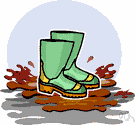clay
Also found in: Thesaurus, Acronyms, Idioms, Encyclopedia, Wikipedia.
Related to clay: Henry Clay, Michaels
clay
(klā)n.
1.
a. A fine-grained, firm earthy material that is plastic when wet and hardens when heated, consisting primarily of hydrated silicates of aluminum and widely used in making bricks, tiles, and pottery.
b. A hardening or nonhardening material having a consistency similar to clay and used for modeling.
2. Geology A sedimentary material with grains smaller than 0.002 millimeter in diameter.
3. Moist sticky earth; mud.
4. The human body as opposed to the spirit.
[Middle English clei, from Old English clæg.]
clay′ey (klā′ē), clay′ish adj.
American Heritage® Dictionary of the English Language, Fifth Edition. Copyright © 2016 by Houghton Mifflin Harcourt Publishing Company. Published by Houghton Mifflin Harcourt Publishing Company. All rights reserved.
clay
(kleɪ)n
1. (Geological Science) a very fine-grained material that consists of hydrated aluminium silicate, quartz, and organic fragments and occurs as sedimentary rocks, soils, and other deposits. It becomes plastic when moist but hardens on heating and is used in the manufacture of bricks, cement, ceramics, etc.
2. earth or mud in general
3. (Literary & Literary Critical Terms) poetic the material of the human body
vb
(tr) to cover or mix with clay
[Old English clǣg; related to Old High German klīa, Norwegian kli, Latin glūs glue, Greek gloios sticky oil]
ˈclayey, ˈclayish, ˈclayˌlike adj
Clay
(kleɪ)n
1. (Biography) Cassius. See Muhammad Ali
2. (Biography) Henry. 1777–1852, US statesman and orator; secretary of state (1825–29)
Collins English Dictionary – Complete and Unabridged, 12th Edition 2014 © HarperCollins Publishers 1991, 1994, 1998, 2000, 2003, 2006, 2007, 2009, 2011, 2014
clay
(kleɪ)n.
1. a natural earthy material that is plastic when wet, consisting essentially of hydrated silicates of aluminum: used for making bricks, pottery, etc.
2. earth; mud.
3. earth regarded as the material from which the human body was formed.
4. the human body, esp. as distinguished from the spirit or soul.
[before 1000; Middle English; Old English clǣg, c. Old Frisian klāy, Middle Dutch, Middle Low German klei]
clay′ish, clay′like`, adj.
Clay
(kleɪ)n.
1. Cassius Marcellus, 1810–1903, U.S. antislavery leader.
2. Cassius Marcellus, Jr., original name of Muhammad Ali.
3. Henry, 1777–1852, U.S. statesman and orator.
4. Lucius (DuBignon), 1897–1978, U.S. general.
Random House Kernerman Webster's College Dictionary, © 2010 K Dictionaries Ltd. Copyright 2005, 1997, 1991 by Random House, Inc. All rights reserved.
clay
(klā) A stiff, sticky, earthy material that is soft and flexible when wet and consists mainly of various silicates of aluminum. It is widely used to make bricks, pottery, and tiles.
The American Heritage® Student Science Dictionary, Second Edition. Copyright © 2014 by Houghton Mifflin Harcourt Publishing Company. Published by Houghton Mifflin Harcourt Publishing Company. All rights reserved.
clay
Past participle: clayed
Gerund: claying
| Imperative |
|---|
| clay |
| clay |
Collins English Verb Tables © HarperCollins Publishers 2011
clay
1. The potter’s basic material, found just below the topsoil, formed by decomposition of rock: kaolin or china clay, a pure white, coarse clay; ball clay, a highly plastic, fine pure clay; fireclay, a dark rough clay, able to stand high temperatures, but not plastic; buff or stoneware, a smooth plastic clay hardening at high temperatures.
2. Sheet-like silicates held together by water. Clays tend to be plastic when wet and hard or powdery when dry.
Dictionary of Unfamiliar Words by Diagram Group Copyright © 2008 by Diagram Visual Information Limited
ThesaurusAntonymsRelated WordsSynonymsLegend:
Switch to new thesaurus
| Noun | 1. |  clay - a very fine-grained soil that is plastic when moist but hard when fired clay - a very fine-grained soil that is plastic when moist but hard when firedbrick - rectangular block of clay baked by the sun or in a kiln; used as a building or paving material adobe - the clay from which adobe bricks are made argil - a white clay (especially a white clay used by potters) atomic number 14, Si, silicon - a tetravalent nonmetallic element; next to oxygen it is the most abundant element in the earth's crust; occurs in clay and feldspar and granite and quartz and sand; used as a semiconductor in transistors china clay, china stone, kaolin, kaoline, porcelain clay, terra alba - a fine usually white clay formed by the weathering of aluminous minerals (as feldspar); used in ceramics and as an absorbent and as a filler (e.g., in paper) red clay - clay whose redness results from iron oxide pipeclay, terra alba - fine white clay used in making tobacco pipes and pottery and in whitening leather bentonite - an absorbent aluminum silicate clay formed from volcanic ash fireclay - a heat-resistant clay Kitty Litter - granulated clay; placed in a container where it absorbs the waste products of a cat or dog potter's clay, potter's earth - clay that does not contain any iron; used in making pottery or for modeling daub - material used to daub walls roofing tile, tile - a thin flat slab of fired clay used for roofing |
| 2. |  clay - water soaked soil; soft wet earth clay - water soaked soil; soft wet earth bleaching clay, bleaching earth - an adsorbent clay that will remove coloring from oils mud pie - a mass of mud that a child has molded into the shape of pie | |
| 3. | Clay - United States general who commanded United States forces in Europe from 1945 to 1949 and who oversaw the Berlin airlift (1897-1978) | |
| 4. |  Clay - United States politician responsible for the Missouri Compromise between free and slave states (1777-1852) Clay - United States politician responsible for the Missouri Compromise between free and slave states (1777-1852) | |
| 5. |  clay - the dead body of a human being; "the cadaver was intended for dissection"; "the end of the police search was the discovery of a corpse"; "the murderer confessed that he threw the stiff in the river"; "honor comes to bless the turf that wraps their clay" clay - the dead body of a human being; "the cadaver was intended for dissection"; "the end of the police search was the discovery of a corpse"; "the murderer confessed that he threw the stiff in the river"; "honor comes to bless the turf that wraps their clay"dead body, body - a natural object consisting of a dead animal or person; "they found the body in the lake" cremains - the remains of a dead body after cremation |
Based on WordNet 3.0, Farlex clipart collection. © 2003-2012 Princeton University, Farlex Inc.
clay
nounRelated words
adjective figuline
adjective figuline
Collins Thesaurus of the English Language – Complete and Unabridged 2nd Edition. 2002 © HarperCollins Publishers 1995, 2002
Translations
صَلْصالطين خَزَفي، صَلْصال
hlína
ler
savi
glina
agyag
leir
粘土
점토
molis
māls
hlina
glina
lera
ดินเหนียว
đất sét
clay
[kleɪ]Collins Spanish Dictionary - Complete and Unabridged 8th Edition 2005 © William Collins Sons & Co. Ltd. 1971, 1988 © HarperCollins Publishers 1992, 1993, 1996, 1997, 2000, 2003, 2005
clay
[ˈkleɪ]Collins English/French Electronic Resource. © HarperCollins Publishers 2005
clay
n → Lehm m; to have feet of clay or (US) clay feet → einen Makel auf seiner weißen Weste haben ? also potter1
clay
:clay pigeon
n → Tontaube f
clay pigeon shooting
n → Tontaubenschießen nt
clay pipe
n → Tonpfeife f
Collins German Dictionary – Complete and Unabridged 7th Edition 2005. © William Collins Sons & Co. Ltd. 1980 © HarperCollins Publishers 1991, 1997, 1999, 2004, 2005, 2007
Collins Italian Dictionary 1st Edition © HarperCollins Publishers 1995
clay
(klei) noun a soft, sticky type of earth which is often baked into pottery, china, bricks etc.
Kernerman English Multilingual Dictionary © 2006-2013 K Dictionaries Ltd.
clay
→ صَلْصال hlína ler Lehm πηλός arcilla savi argile glina argilla 粘土 점토 klei leire glina argila глина lera ดินเหนียว kil đất sét 粘土Multilingual Translator © HarperCollins Publishers 2009